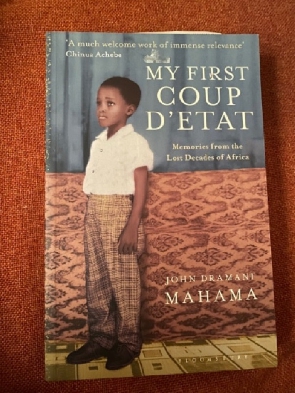The opening chapter of His Excellency John Dramani Mahama’s book (My First Coup D’etat) is entitled “The Lost Decades”.
It comes in six pages only and does explain the slow-paced and opaque performance of African States post-independence in the 1970s and 1980s and into the early part of the 1990s.
The author believes that by the late 1950s Ghana, and by far, Africa (sixteen other African countries were reported to have liberated themselves by 1960 alone) had begun basking in good economies after gaining independence.
But this glory, Ghana’s own in particular, would later ossify into a coup — that which toppled Dr Kwame Nkrumah’s government and forced the country to kneel before agents of neo-colonialists.
Readers, in brevity, would be taken aback by a perfect description of the source of happiness for Africans through the African way of those times.
This chapter of the book should mean a lot to Africans, especially those who didn’t experience the 1940s and 1980s. Africa had had its way of a civilization long before the advent of the white colonists. We just love to slack.
Professor PLO Lumumba once gave a lecture where he nearly wept, as it’s now evident that contemporary Africans don’t regard their forms of edutainment. For football, they prefer English Premier League (EPL). For drama series, they’d go for a Mexican Telenovela and whatnot.
The author reminisced, what I would say, is in conjunction with Prof PLO Lumumba’s outcry. But rather in an exhilarating tone — that Africa was evolving and had pretty metamorphosed into beautiful sunshine in the 1960s — even that the Western World took a keen interest in borrowing its light of “visual arts, literature, music, and international cultural heritage,” not forgetting the introduction of “dashikis, geles, fufu and jollof rice.”
We know of the sweet melodies of ‘Osibisa’, “Makosa” from Manu Dibano, “Pata Pata” (a hit song from Miriam Makeba), the master class of Afrobeat from Fela Anikulapo Kuti. And that of literature: Chinua Achebe’s ‘Things Fall Apart’, ‘The Beautiful Ones Aren’t Yet Born’ by Ayikwei Armarh, ‘Weep Not, Child’ by Ngúgi wa Thiong’o, and ‘So Long A Letter’ by Mariama Ba.
These feats and many others were making Africa a success until the political recession slowly started in the late 60s and, by the mid-70s Africa had been infested with a ‘brain drain’. Most of her intellectuals, politicians, sportsmen, professionals, and artists left abroad “either a forced or self-imposed exile.”
The ‘lost decades’ aren’t synonymous with the African continent alone. From 500-1500 AD the westerners also did experience what Francesco Petrarch coined as the “Dark Ages”. Europe suffered a virulent decline in intellectualism, economy and culture for about 900 years.
But the difference between what Europe and Africa suffered was that the former resurrected itself while the latter depends on the resurrection of the former to further keep its exploits buried alive.
Africa’s loss had since been perennial. Nigeria is still experiencing power outages regardless of its plentiful oil reserves. Ghana can’t produce chocolate, still exporting raw cocoa. Only God knows what Niger does with its Uranium. Citizens of Congo keep killing each other for diamonds.
Even today there are Africans that feel it makes sense to sound British than a Nigerian or Kenyan. Everything from the West is a glory to us regardless of its backwardness. We have lost steam of our self-esteem. We think, without being white, we are morons and an ugly race. Pathetic!
The inferiority complex is eating our conscience. We don’t believe in ourselves that we could harness our potential to its maximum capacity in all spheres of our lives, and see to it that Mother Africa begins to shine again.
But who’s to be blamed, citizens or those in government? The problem of Africa could be better solved by Africans. That’s if we’d strike our feet and find solutions for the mess we’ve created.
Opinions of Tuesday, 10 January 2023
Columnist: Abdul Rahman Odoi















